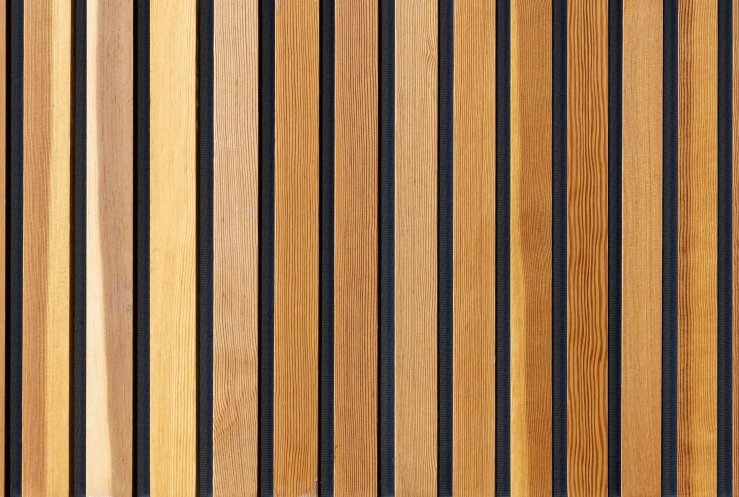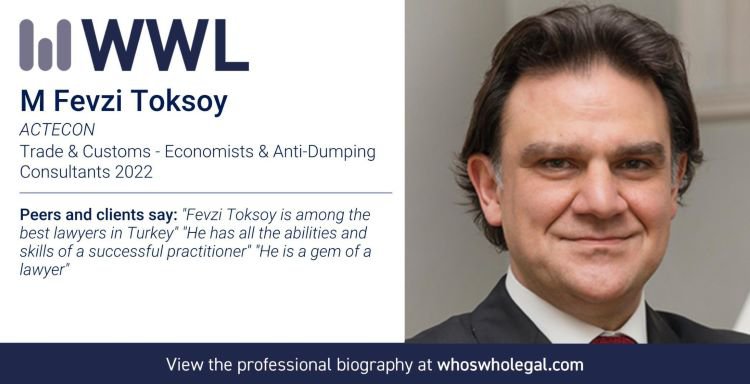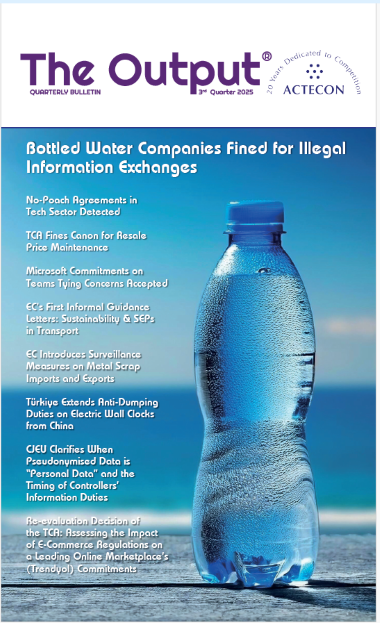The Ankara 13th Administrative Court Rules for the Annulment of Turkish Competition Authority’s Cartel Decision Due to Failure of Standard of Proof (Kronospan)
| Competition Law

The Ankara 13th Administrative Court Rules for the Annulment of Turkish Competition Authority’s Cartel Decision Due to Failure of Standard of Proof (Kronospan)
Article by Bahadır Balkı, Mustafa Ayna, Özlem Başıböyük Coşkun, Arda Deniz Diler and Selim Turan
The Ankara 13th Administrative Court ("Court")[1] recently annulled with its decision (“Court Decision”) the Turkish Competition Authority's ("TCA") cartel determination[2] (“TCA Decision”) against Kronospan Orman Ürünleri San. ve Tic. A.Ş. (“Kronospan”) in a decision through which it had imposed on 11 undertakings active in the MDF and flakeboard markets an administrative monetary fine for violating Article 4 of Law No. 4054 on the Protection of Competition ("Competition Law").
When the Court closely examined the issue at hand, it concluded that the TCA's judgment did not comply with the law, due to the incorrect assessment that Kronospan, a party to the investigation, had been a member of a cartel.
Background of the Case
In 2018, the TCA launched an investigation against undertakings operating in the fields of MDF and flakeboard to determine whether they had violated Article 4 of the Competition Law (similar to Article 101 of the Treaty on the Functioning of the European Union).
It was concluded in the TCA Decision that undertakings had attended the MDF and Flakeboard Industry Association (“Association”) meetings on the dates of 05 March 2014 and 22 March 2017, respectively, and had engaged in an agreement/concerted practice to determine the percentages and timing of the price increases in 2014 and 2016-2017 in the said meetings.
For the meeting, which was held on 05 March 2014, the attendees had been unknown, and the TCA had not proved that Kronospan had attended. As for the meeting held on 22 March 2017, the meeting minutes including the list of attendees submitted to the TCA by the Association had shown that Kronospan had not attended the meeting.
However, the TCA ruled that Kronospan had been a member of the cartel on the grounds that (i) it had been a (reserve) member of the Association's board of directors and (ii) its price movements had occurred at a similar rate and in similar dates to those of its competitors.
During the investigation process, Kronospan had claimed that it was merely a reserve member of the Association's board of directors and that it had not attended the meetings in question. However, the TCA had dismissed the claim, holding that it makes no difference whether the participants in the Association's meetings were full or reserve members and that undertakings that are reserve members may likewise participate in or be aware of the board meetings' decisions. The TCA further underlined that, in addition to Kronospan's membership on the Association's board, its pricing decisions had been in line with those of its competitors.
Accordingly, the TCA found that 11 undertakings, including Kronospan, had violated Article 4 of the Competition Law by price fixing. The TCA had imposed an administrative monetary fine of TRY 9,441,035.97 (approx. EUR 1,175,720.54[3]) on Kronospan, based on its turnover achieved in 2019.
Following Kronospan’s appeal of the TCA Decision, the Ankara 13th Administrative Court ruled that the TCA Decision had not been in accordance with the law, and consequently annulled it.
The TCA Shall Prove a Cartel beyond a Reasonable Doubt: Is Being a Member of an Association Sufficient to Show that One is a Party to a Cartel?
When the reasons for the Court Decision are examined in greater detail, it becomes apparent that (i) there is no record of Kronospan having attended any meetings held within the Association, and (ii) even though Kronospan had increased the sales prices of certain products examined in the investigation, its pricing movements had occurred well after those of other undertakings operating in the relevant market. Indeed, in its assessment, the Court revealed that:
- there is no record of Kronospan's having attended the meeting held on 05 March 2014 at the Association,
- Kronospan also had not attended the meeting held on 22 March 2017 at the Association and the TCA also had recognized it,
- despite the fact that Kronospan had increased the sales prices of MDF and flakeboard products at the same or very similar rates with other undertakings, its pricing movements had occurred far later than the other undertakings operating in the MDF and flakeboard markets, and
- there is no evidence to prove that Kronospan collaborated with other undertakings in the market to decide the dates and rates of price increases in 2014 and 2017.
Accordingly, the Court concluded that it could not be said that Kronospan had violated Article 4 of the Competition Law by entering into an anti-competitive agreement on the foregoing grounds.
The Court Decision is of importance since it found the standard of proof taken into account by the TCA to reach a cartel violation had been insufficient. In this regard, the Court underlined that there was no dispute between the parties on the fact that Kronospan did not attend the meeting. In other words, the Court stated that the TCA recognized Kronospan did not attend the meeting. Thus, the Court established with its decision that an undertaking that is a member of an association shall not be held liable for an anti-competitive agreement made by the other members of the association with which it had not involved.
The Court also rejected the TCA's economic justifications for its arguments. The Court underlined that Kronospan’s price changes had occurred much later than those of its competitors, and held that while an undertaking may increase its prices in the same or similar manner as other undertakings, this pricing behaviour cannot establish itself that the undertaking is a party to an anti-competitive agreement.
A number of TCA decisions previously had been overturned for failing to meet the standards of proof. Accordingly, this Court Decision is of importance as it has reaffirmed the administrative courts' approach towards the TCA decisions rendered without providing any proof beyond a reasonable doubt.
[1] The Ankara 13th Administrative Court’s Decision dated 31.10.2022 and numbered E.2022/445 K.2022/272.
[2] The TCA’s decision dated 01.04.2021 and numbered 21-18/229-96.
[3] The average EUR buying rate of exchange of the Central Bank of Turkey (8.03) for 2020 was taken as the basis in calculating the amount of the fine in TRY.






